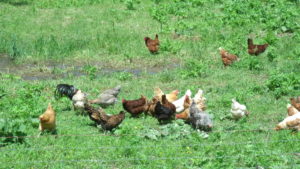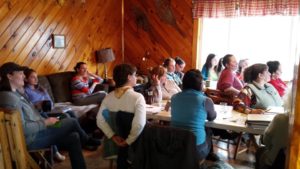Holistic Management at Mulligan Creek Acres
Holistic management provides beginning women farmers with a course on whole farm planning.
There are many tools that a farmer needs when he or she is starting out; seeds, livestock, equipment – the list goes on and on. But those physical tools are only one side of farming. Three years ago, I left “traditional” employment and took on the task of building a small, sustainable farm on land that had not been farmed since the 1990’s. My partner, Ancel, worked construction, so we had funds to live on while I worked on developing Mulligan Creek Acres. Like every other beginning farmer, we needed structures, fencing, equipment, livestock, feed, business plan, marketing models, the list was never ending. It is certainly easy to feel defeated when faced with a laundry list of decisions to be made, a large capital investment plus the on-going operating funds and health of your livestock, soil or plants.
While doing research for the farm, I came upon a listing for “Holistic Management’s Beginning Women Farmer Program.” I didn’t feel like a beginning farmer, as growing up my family always had livestock as had Ancel’s family. Yet there was a draw for me to reach out and find out more about Holistic Management (HM).
After doing research online, I was even more intrigued and decided to fill out an application. I was accepted to the program and began class one cold November day. It was a class filled with approximately 20 other women of all ages and backgrounds, 4 female mentors, 2 instructors, and a program coordinator. Opening the classroom door that day was the best move I have ever made for my farm.
There wasn’t a lot of time spent on perfunctory conversation, we got right down to work. We started to work on a real life farming scenario and began brainstorming opportunities and enterprises. This was our introduction to HM. Our class went from November to May, meeting a couple of Saturdays on month, taking on new topics at each class.
Holistic Management functions on the principle that all of nature functions in wholes. This means that all aspects must be taken into account when making a decision, as you cannot change one thing without impacting something else. A second principle is that you must also understand your environment. The practices of Holistic Management focus on defining what you manage, stating what you want, aiming for healthy soil, considering all tools available to you, and testing your decisions and monitoring your results.
Often in farming, I find that people focus on what they don’t have or can’t afford. We were tasked to create our resource inventory. This is a mindful compilation of all of our assets and resources – tools, technology, land, people, animals, skills/creativity or money. I found there to be great power in the acknowledgment of all of the resources that you have available to you. A resource inventory is a valuable tool when you are brainstorming potential enterprises and opportunities. In addition to the resource inventory, we set out to create our holistic goal; an overarching goal of our farm, which included defining our values and developing quality of life statements.
One of the foundation tools of HM is the decision making process. This process, known as “testing your decisions,” focuses on asking yourself a series of seven questions. The testing questions serve as a tool in informed decision making. It continues to be based on the premise that all of nature functions in wholes and it questions if your action is in line with the triple bottom line – environmental, social and financial and is it moving you closer to your Holistic Goal. The triple bottom line is always taken into consideration when making decisions on our farm. How will my decision impact the animals and the land? Is this decision in line with my holistic goal, my vision and values? I am comfortable with the source of money that I am using or borrowing? Through this process you gain the realization that you cannot make a decision without impacting something or someone else. While learning about decision making and testing your decisions, we also learned about time management.
The topics then moved to focus on increasing the overall profitability of the farm, creating a whole farm financial plan and enterprise budgeting. We learned to develop “enterprise budgets,” accounting for all aspects of the cost of production for a single enterprise. The course curriculum taught how to plan for profit. This method strategically plans upfront for your profit instead of the traditional model of taking whatever funds remain as profit.
As winter went on, course delved into creating marketing plans, working on the basics of business planning, leadership and communication skills. All lessons were building blocks on session built on the one before it, always keeping in mind, “how to test our decisions” and looking that the “triple bottom line.”
Finally, as spring broke, we ventured out to farms and learned about land and infrastructure planning, improving land health with livestock and soil building, soil fertility basics and environmental impacts. These classes offered hands on opportunities which led to a more impressionable experiences.
The ten sessions resulted in a well-rounded whole farm planning educational experience. Yet, this was not the only take away from Holistic Management’s Beginning Women Farmer Program. We were assigned mentors from the first session that guided us and supported us through the entire program. Our mentors and the state program coordinator, Sarah Williford, connected to us via email, phone and farm visits to offer every tool to support us on our path to becoming successful farmers. Program instructors are certified through Holistic Management and come from backgrounds in agriculture, Cornell Cooperative Extension and RC&D.
The program offers the opportunity for a solid foundation for all that choose to participate. Program sessions offer a way for new farmers to build confidence, knowledge, skills and commit to their own values and goals. Women work together in sessions and form lasting friendships as a result.
Nearly three years later, as a graduate of the program, I now serve as a program mentor to women. The opportunities afforded to me as a result of the skills and knowledge that I gained during Holistic Management as served to better myself, my family, and Mulligan Creek Acres. The farm has grown every year without incurring any debts, our soils are rich and improving every season, and we move closer to our Holistic Goal with every decision made.
The next session of Holistic Management will be beginning in late 2015 – early 2016. For more course information and to have any questions answered please reach out to Sarah Williford, New York State’s Beginning Women Farmer Program Coordinator at sarahwilliford@gmail.com.




We buy chicken, eggs, & pork from Mulligan Creek Acres. Tanya does a great job. Every item is excellent. And the cost is very reasonable. We have worked out pick ups this year and it goes smoothly. We will continue to be part of the CSA.
The very amazing blog is calculatoronweb online online here thanks for sharing